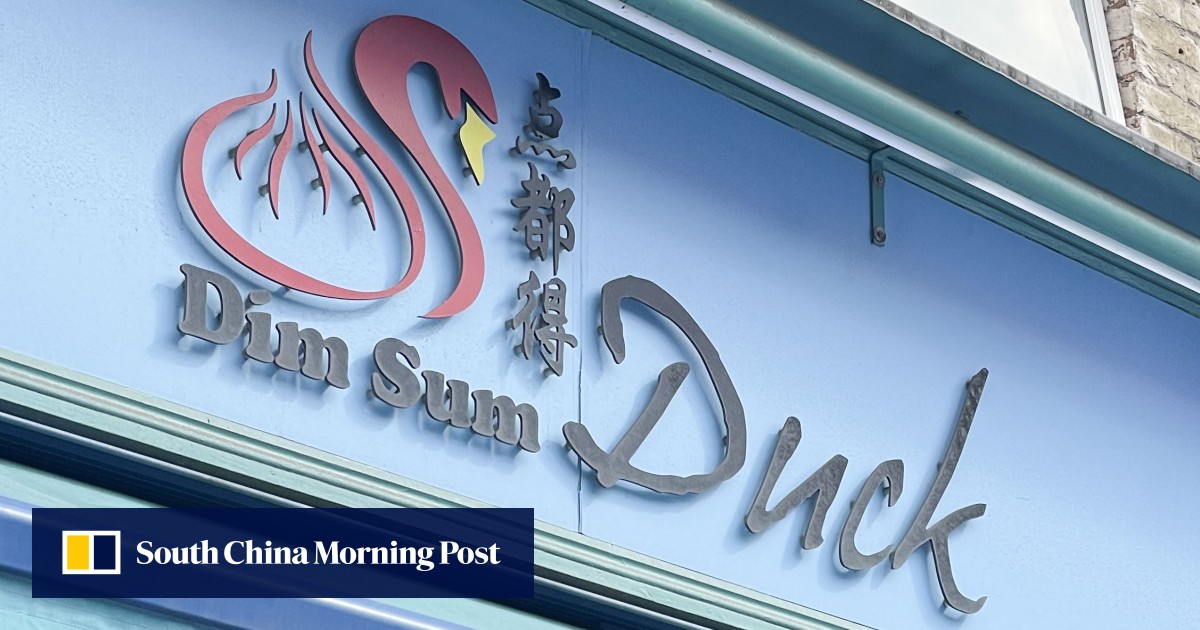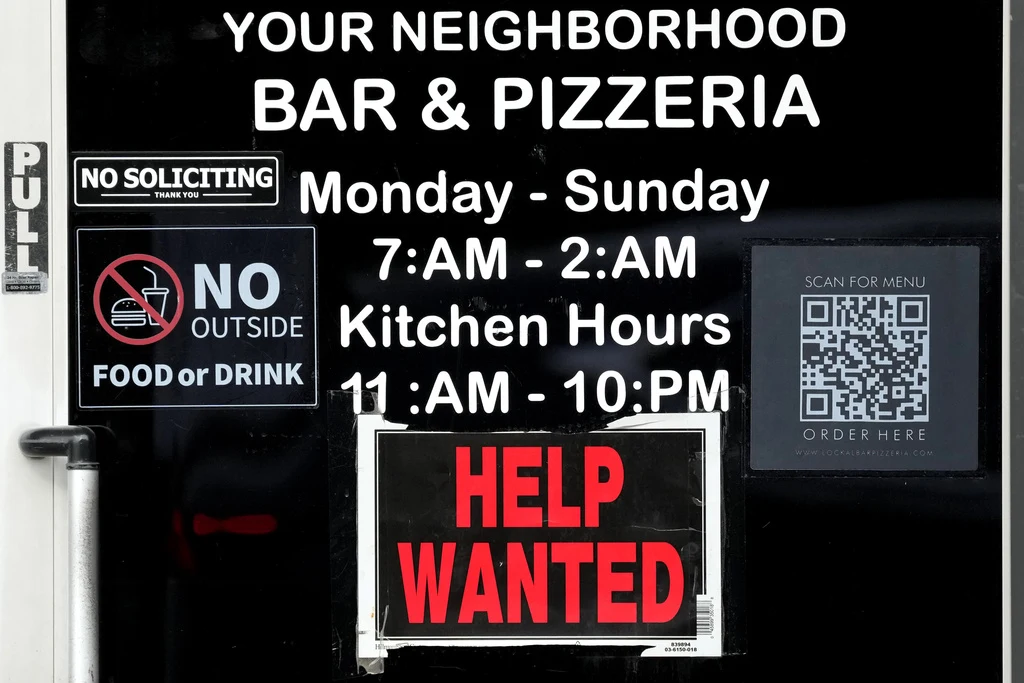Most of the time, understanding dish names requires some level of fluency in Chinese, though not always. But what happens when names get lost in translation on their way to English?
I found myself pondering this as I queued to get into Dim Sum Duck, in London’s King’s Cross – the Michelin Guide-recommended restaurant that is coveted for its handmade dim sum and in-house roast duck.
Ogling its sign for much longer than my stomach could handle, I mused that “dim sum duck” is fairly straightforward as names go – it does what it says on the tin, right? But on closer scrutiny, its Chinese name, displayed in much smaller lettering, tickled my pun-loving sensibilities: 点都得.
The Cantonese phrase “dim dou duk”, which roughly translates to “anything is possible” or “nothing goes wrong”, turns out to be a close phoneticisation of Dim Sum Duck with an entirely different meaning.
The millennial dumpling makers spreading the word about a Chinese staple
The millennial dumpling makers spreading the word about a Chinese staple
Now, if you are well versed in regional Cantonese gastronomy, you might also be aware that this name is a strategic deviation from Diandude 点都德, a teahouse chain originating in Guangzhou that deploys a spectacular pun on the last word, replacing 得 (“possible”) with its homophone 德 (“virtue”).
A few days later I wandered past Shu La La, a popular barbecued skewer and Sichuanese hotpot joint just northeast of King’s Cross in an area called Holloway. Its name exudes continental flair, rhyming with a Francophonic exclamation that hints at sophistication within.
Nevertheless, Shu La La’s Chinese name, 蜀一蜀二, does not correlate one bit. The phrase itself is a clever homophone of 数一数二 (pronounced “shǔ yī shǔ èr” in Mandarin), meaning “one of the very best”. But in Shu La La’s case the 数 has been swapped out for 蜀, referencing the ancient Shu kingdom that is now known as Sichuan province.
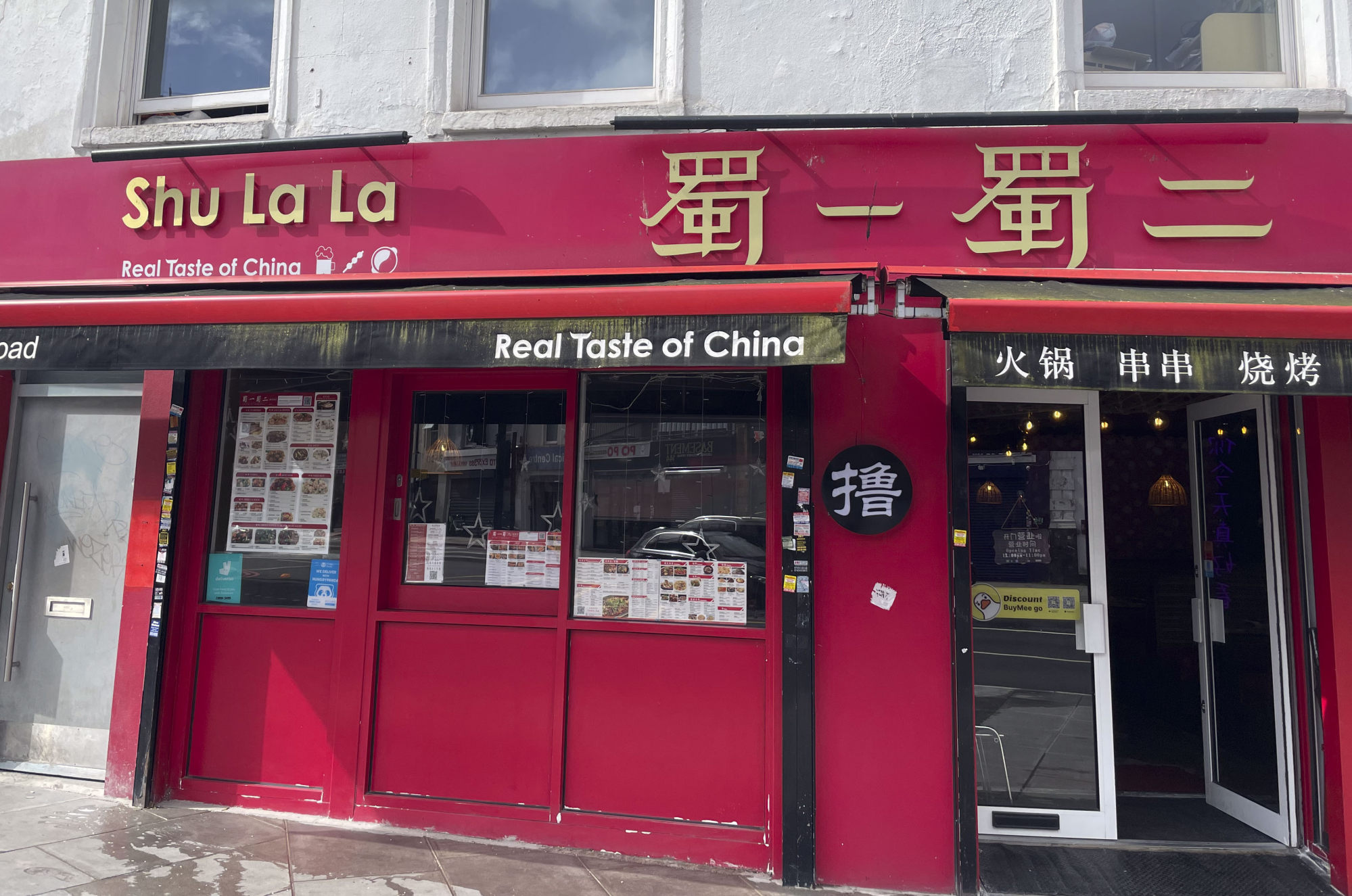
Bemused that this bilingual wordplay has been in front of my eyes all along, I start to go on a virtual walking tour of British Chinese restaurants and takeaways using Google Street View. No longer restricted by motorway traffic, I visit far-flung corners of the British Isles, seeking out signage that conceals Easter eggs.
In Glasgow’s trendy West End I find the monosyllabic Chow, boasting a respectable 3.8 stars on Google reviews. On first impression, it is not a particularly unusual name for a food-related business, especially a Chinese one that could ostensibly be an eponym.
But its Chinese name is 不見不散 – a colloquial phrase for “be there or be square”, or “see you there”. In that regard, perhaps Chow itself is a homophone for “ciao”; a challenging pun that requires its punters to stretch linguistically across three cultures.
I like to think that the business owners who came up with these witty names were encoding a little in-joke for the overseas Chinese community, a hidden message for posterity
In Stornoway, in the Outer Hebrides – population 7,000 – I scroll past Fusion Takeaway. What’s so fusion about the food, I wonder. It labels itself as a Chinese Malaysian takeaway, with clues of hybridity in the Malaysian satay and curry sections of its menu.
“Fusion”, however, has been phoneticised to 富山 (foo shan) – meaning “rich with mountains”.
It is also the Japanese name for the coastal city of Toyama, which backs onto the majestic, expansive Tateyama mountains. And there, on a photo of Fusion Takeaway’s folded menu, I spot a logo of an imperious mountain range, rising out of the mist.
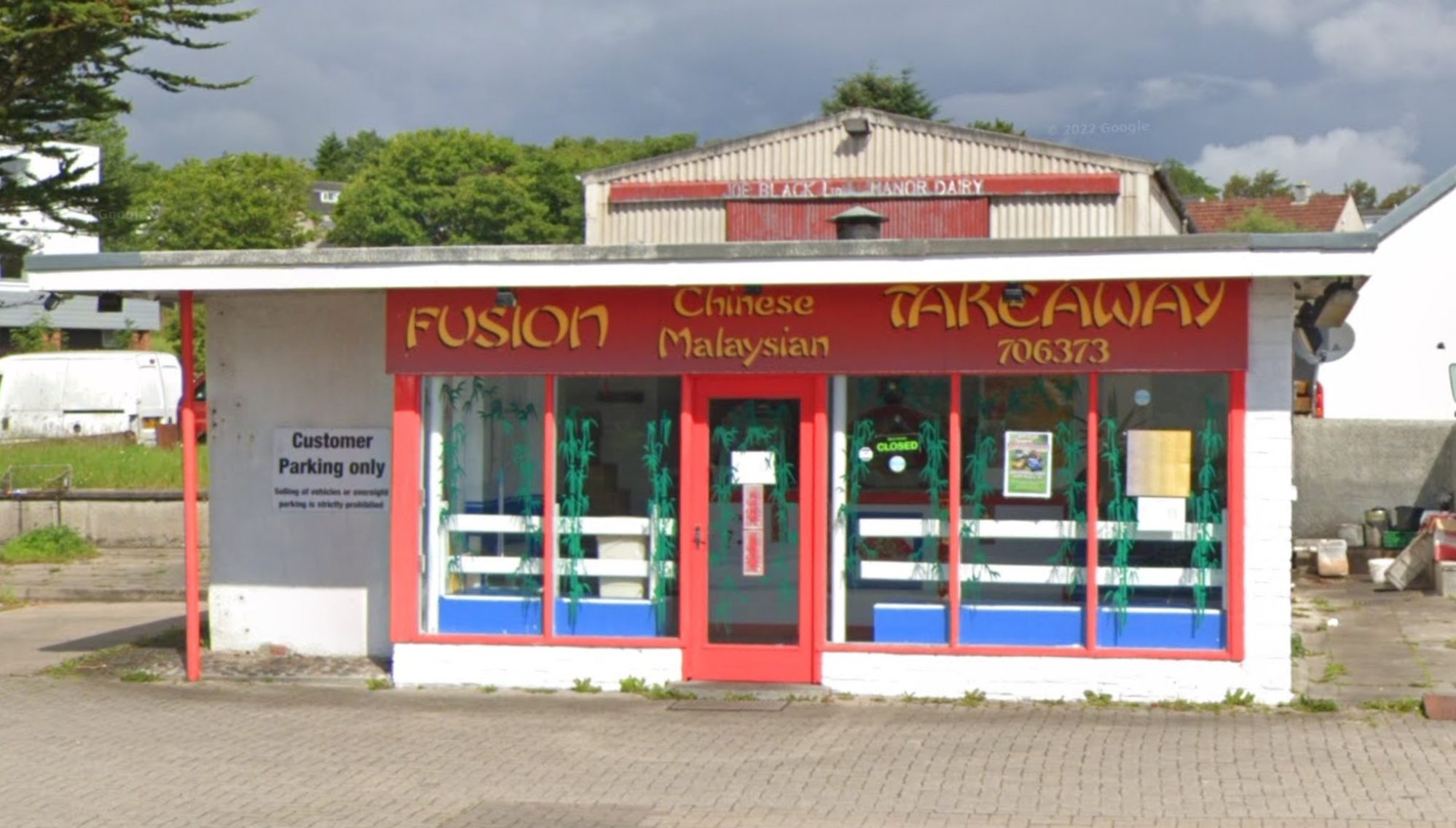
The link to Toyama is unclear; nevertheless it is an evocative name for such a remote establishment situated on a concrete roundabout.
Back in London is Paddington’s Pearl Liang – my preferred place to take guests for dim sum in an elegant setting. Its English name is a fittingly opalescent interpretation of 漂亮 (piu leong), meaning “pretty” in a literally bright sense – like a pearl, I guess.
Pearl Liang’s half English, half Chinese homophone-based name requires its punters to perform a lexical switcheroo halfway through reading it.
Then there are establishments where the English and Chinese names have no correlation. My hunch is that these are dynastic restaurants from a bygone era; a time when even the slightest nuance would have whooshed over the heads of British clientele.
For example, there is the institutional Gerrard’s Corner, whose name is more or less a set of cardinal directions: it literally sits on the intersection of Gerrard Street and Wardour Street in London’s Chinatown. But its Chinese name, embossed in gold lettering on the restaurant facade, has more poignant aspirations: 好年華大酒樓 – “the good years grand restaurant”.

There is also The Good Earth, a family-owned chain of British-Chinese restaurants that was founded in 1979.
Mahjong aficionados will know its Chinese name, 大三元, as a hand that involves collecting three of a kind of all three dragon tiles. But its English name is taken from Pearl S. Buck’s 1931 novel, which was also adapted into a film in 1937; presumably a more familiar reference than a kind of triumphant pung.
The Good Earth’s founder Holland Kwok confirmed that 大三元 was taken from a 150-year old restaurant in his hometown Guangzhou, and refers to the old imperial examination system.
And since the general British public’s knowledge of Chinese diaspora history is so cursory, I doubt most people ordering their roast meats from the famous Gold Mine in Bayswater will read into its Chinese name, 金山楼, as a nod to “gum shan” or the “gold mountains” – a nickname for San Francisco during the Gold Rush of the mid-19th century.
‘Food of the people’: how fermented foods show Asia’s parallels
‘Food of the people’: how fermented foods show Asia’s parallels
Of course, the translational in-jokes traverse both ways. It would be remiss not to mention one of Hong Kong’s most beloved restaurants, whose name international visitors and expat residents alike love to roll around their mouths for the puerile thrill of it.
The 口利福 reconfigures the order of the more commonly used restaurant name 利口福. Indeed, the bygone Lee Ho Fook in London’s Chinatown is name-dropped in the 1978 song “Werewolves of London”, by Warren Zevon. Never let grammar get in the way of a good pun, though!
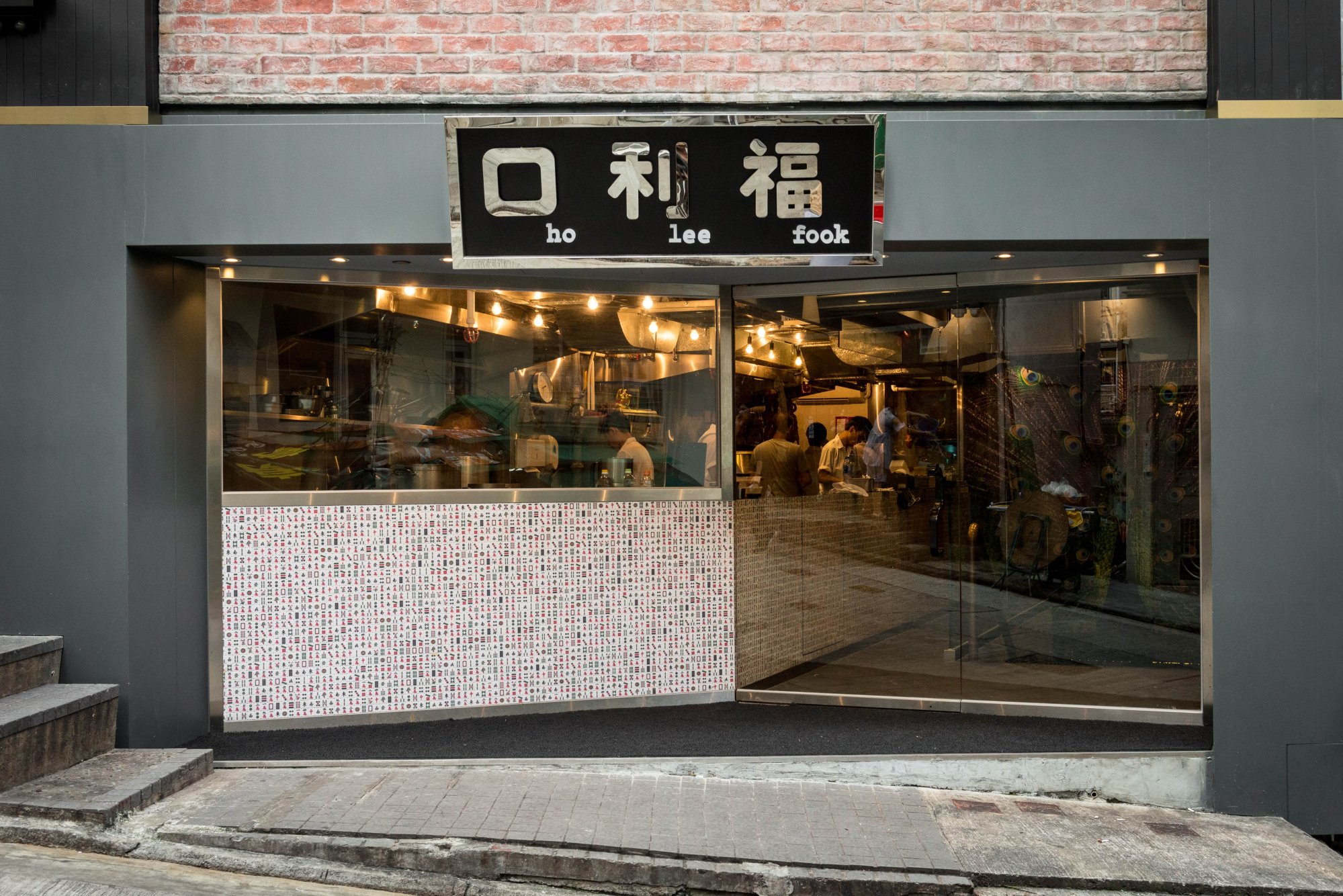
For all the Golden Dragons, Jade Gardens and China Expresses that salt and pepper Britain’s high streets, you will always find nomenclatures that make you look twice.
I like to think that the business owners who came up with these witty names were encoding a little in-joke for the overseas Chinese community, a hidden message for posterity.
Some names resist translation and that is OK. We just need to know how to read the signs.

